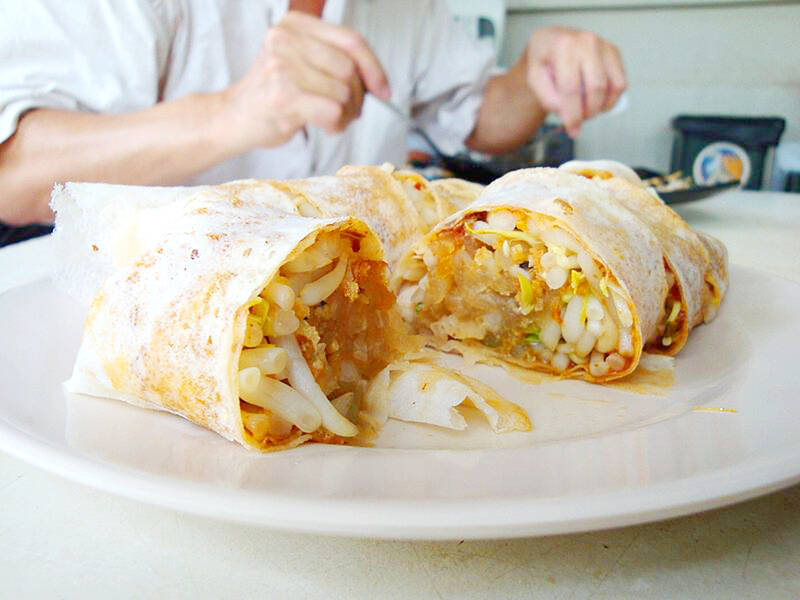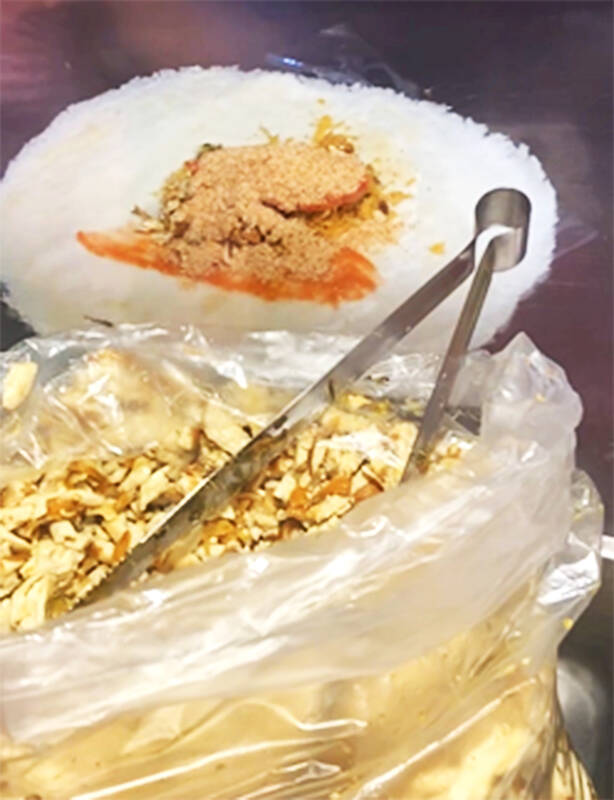Runbing, a delicacy with a rich history in worship customs, is made from a thin, crepe-like wrapper used to wrap a cooked filling into a roll. Runbing in some regions is sometimes referred to as a spring roll, but it is important to note that it is not fried like traditional spring rolls with crispy brown exteriors. The runbing wrapper is made by spreading a thin layer of high-gluten flour batter evenly onto a hot pan. The resulting white wrapper is soft and flexible.
潤餅的歷史悠久,長久以來人們會在祭拜時享用,是用薄薄的麵皮包裹煮熟的餡料。有的地方習慣將潤餅稱作春捲,但和傳統炸得外皮金黃酥脆的春捲不同,潤餅不須油炸即可食用。潤餅皮的作法是將高筋麵糰在熱鍋上均勻塗薄薄一層,外皮呈白色,柔軟有韌度。
high-gluten flour (n. phr.) 高筋麵粉

Photo: Wiki Commons l 照片: Wiki Commons
flexible (adj.) 柔韌的,有彈性的
Around the Qingming Festival, it is a tradition that families prepare food offerings to their ancestors, such as fruit and meat. As part of this tradition, families in Taiwan also eat runbing together. Each member sits around the dining table and wraps runbing with a variety of cooked fillings. Although the fillings may vary between households, one essential flavor that cannot be left out is the mixture of crushed peanuts and sugar. When combined with the fillings, it gives runbing a delicious savory-sweet taste.
臨近清明時節,台灣的家庭會向祖先供奉水果和肉類等供品,除此之外,一家人也會吃潤餅。大家圍坐餐桌旁一起包潤餅,桌上擺滿各式各樣的餡料。家家戶戶的餡料可能不太一樣,但其中最不可少的滋味是花生粉,讓潤餅嘗起來鹹鹹甜甜的。

Photo: Bookman/照片:書林
Typically, cooked fillings include shredded carrots, cabbage, dried tofu, mung bean sprouts and sliced egg crepes. Regional fillings such as oil noodles and Taiwanese sausage are found in Tainan, while velvet shrimp, lima beans and sugar are also popular ingredients. Other than the crushed peanuts, the filling is often seasoned with onions, garlic, scallions and coriander.
潤餅常用的熟餡料有紅蘿蔔絲、高麗菜、豆干、豆芽菜和蛋絲。油麵和台式香腸是台南風味的潤餅餡,火燒蝦、皇帝豆和糖粉也是當地特有的滋味。除了用花生糖粉調味,也會放點洋蔥、蒜頭、蔥和芫荽(香菜)。
lima bean (n.) 皇帝豆
The tradition of eating runbing in Taiwan is believed to have its roots in ancient China. One story goes back to the Spring and Autumn Period (c. 770 - 481 BCE), when it was a ritual that people offered the god of spring five fresh spices - scallions, garlic, Chinese chives, coriander and brassica. To wish for their good health, people will eat the five spices after worshiping the god. However, since these spices can be pungent if eaten on their own, the custom of wrapping them in a pancake was adopted. Another origin story is related to the Cold Food Festival, which honors Jie Zitui, a loyalist who saved Chong Er, the exiled Duke Wen of Jin, by offering him a piece of his own thigh to eat.
台灣人吃潤餅的由來已久,最早可追溯至古代中國。春秋戰國時期(約公元前770—481年),在春天有用五辛祭祀春神禮俗。五辛為蔥、大蒜、韭菜、芫荽、蕓薹等五種生辛菜蔬,為祈求身體健康,人們會吃五辛,但生辛料不好入口,於是包在餅皮中一起吃下肚。另一個潤餅的由來與寒食節有關,是為紀念介子推。他對公子重耳忠心耿耿,重耳遭流放時,他曾割下自己的大腿肉,讓重耳免於餓死的命運。
ritual (n.) 儀式,典禮
Chinese chives (n. phr.) 韭菜
pungent (adj.) (味道或氣味)辛辣的,刺鼻的
exile (v.) 流放,放逐
Duke Wen of Jin 晉文公
After many years on the throne, the Duke recalled this and wished to reward Jie Zitui for his past contributions. However, Jie had already retreated to the mountains with his mother. As he did not desire wealth or fame, he refused to come out to receive his reward. The Duke ordered soldiers to set fire to the mountain, hoping to smoke him out, but tragically, Jie and his mother perished in the blaze. Filled with remorse, the Duke established the tradition of eating cold food in memory of Jie at the Cold Food Festival, which is held in April near the Qingming Festival. During the Cold Food Festival, people refrain from making fires and eating hot food. Instead, they eat runbing, a food made with precooked ingredients that conforms to the custom of eating only cold food on that day.
重耳登基為晉文公多年後,想起介子推的救命之恩,想要賞賜介子推,但介子推早已和母親入山隱居,他淡泊名利,不願出面受封。重耳於是放火燒山,想把介子推逼出來,但不幸的是,介子推和他母親於大火中雙雙身亡。重耳悔恨不已,於是規定每年寒食節只准吃冷食,以紀念介子推。寒食節在四月,臨近清明節,此時人們不得生火、不吃熱食,所以會吃將食材都先煮熟的潤餅,以符合吃冷食的習俗。
remorse (v.) 懊悔;悔恨
refrain (v.) 節制,忍住
conform (v.) 遵守,順應
文章由書林出版公司提供:
www.bookman.com.tw

In an effort to fight phone scams, British mobile phone company O2 has introduced Daisy, an AI designed to engage phone con artists in time-wasting conversations. Daisy is portrayed as a kindly British granny, exploiting scammers’ tendency to target the elderly. Her voice, based on a real grandmother’s for authenticity, adds to her credibility in the role. “O2” has distributed several dedicated phone numbers online to direct scammers to Daisy instead of actual customers. When Daisy receives a call, she translates the scammers’ spoken words into text and then responds to them accordingly through a text-to-speech system. Remarkably, Daisy

Bilingual Story is a fictionalized account. 雙語故事部分內容純屬虛構。 Emma had reviewed 41 resumes that morning. While the ATS screened out 288 unqualified, she screened for AI slop. She could spot it a mile away. She muttered AI buzzwords like curses under her breath. “Team player.” “Results-driven.” “Stakeholder alignment.” “Leveraging core competencies.” Each resume reeked of AI modeling: a cemetery of cliches, tombstones of personality. AI wasn’t just changing hiring. It was draining the humanity from it. Then she found it: a plain PDF cover letter. No template. No design flourishes. The first line read: “I once tried to automate my

Every May 1, Hawaii comes alive with Lei Day, a festival celebrating the rich culture and spirit of the islands. Initiated in 1927 by the poet Don Blanding, Lei Day began as a tribute to the Hawaiian custom of making and wearing leis. The idea was quickly adopted and officially recognized as a holiday in 1929, and leis have since become a symbol of local pride and cultural preservation. In Hawaiian culture, leis are more than decorative garlands made from flowers, shells or feathers. For Hawaiians, giving a lei is as natural as saying “aloha.” It shows love and

1. 他走出門,左右看一下,就過了馬路。 ˇ He walked outside, looked left and right, and crossed the road. χ He walked outside and looked left and right, crossed the road. 註︰並列連接詞 and 在這句中連接三個述語。一般的結構是 x, y, and z。x and y and z 是加強語氣的結構,x and y, z 則不可以。 2. 他們知道自己的弱點以及如何趕上其他競爭者。 ˇ They saw where their weak points lay and how they could catch up with the other competitors. χ They saw where their weak points lay and how to catch up with the other competitors. 註:and 一般連接同等成分,結構相等的單詞、片語或子句。誤句中 and 的前面是子句,後面是不定詞片語,不能用 and 連接,必須把不定詞片語改為子句,and 前後的結構才相等。 3. 她坐上計程車,直接到機場。 ˇ She took a cab, which took her straight to the airport. ˇ She took a cab and it took her straight